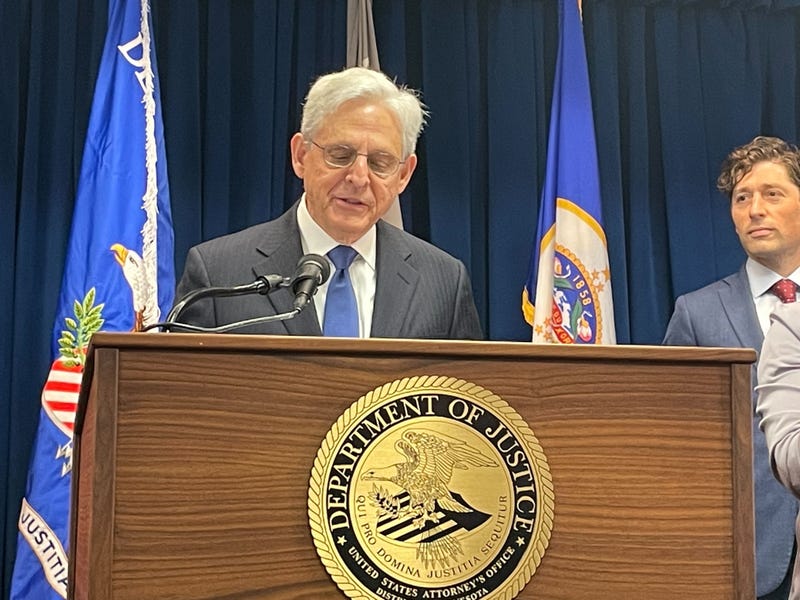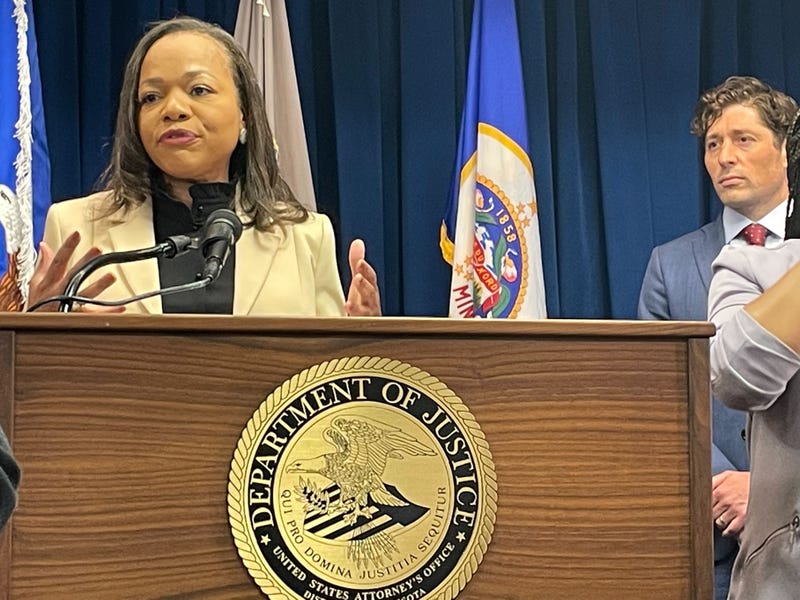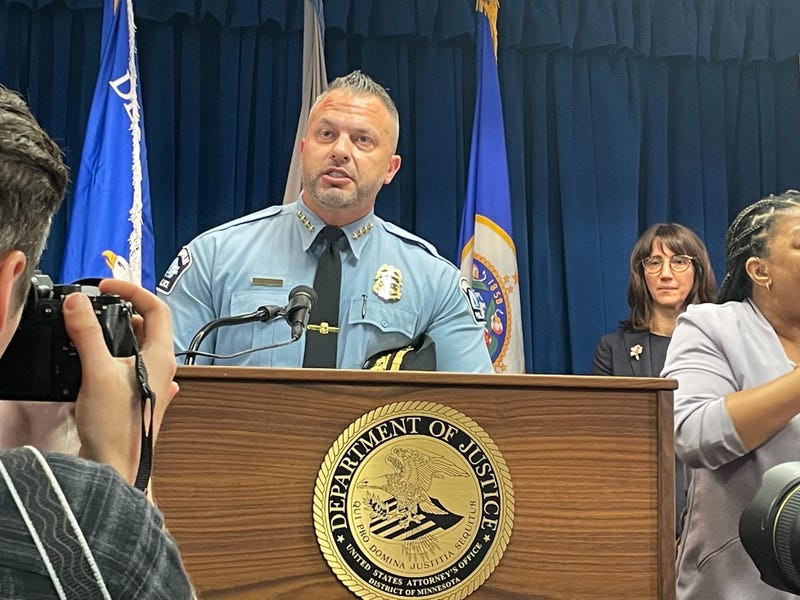
The findings of a two-year investigation of the Minneapolis Police Department, prompted by the death of George Floyd, were announced Friday by U.S. Attorney General Merrick Garland in Minneapolis at the U.S. Courthouse.
Garland was joined by Minneapolis Mayor Jacob Frey, Police Chief Brian O’Hara and others.
"As Mr. Floyd died, other officers failed to intervene," said the Attorney General. "As I told George Floyd's family this morning, his death has had an irrevocable impact on this community, this country and the world. George Floyd should be alive today."
The city and police department now will enter into a consent decree with the Federal Governement.
"I'm here today to announce the findings of that investigation," Garland explained. "I'm also announcing the Justice department, the City of Minneapolis and the MPD have agreed in pricipal to a consent decree."
Consent decrees require transformational change. A city complies with a consent decree when it demonstrates:
It has implemented all the required improvements to policy, training, technology, and operations
Those improvements have translated into measurable, sustainable, constitutional, community-oriented policing
"The findings laid out in this report are troubling," adds Assistant Attorney General Vanita Gupta. "I have seen consent decrees can lead to real and lasting change."
The “pattern or practice” investigation was launched in April 2021, a day after former officer Derek Chauvin, who is white, was convicted of murder and manslaughter in the May 25, 2020, killing of Floyd, who was Black.
"The Justice Department has opened a civil investigation to determine whether the Minneapolis Police Department engages in a pattern of practice of unconstitutional, or unlawful, policing," Garland said two years ago announcing the investigation.
"Thank you, also for a report that is thoughtful, is deliberate, is objective and is thorough," said Minneapolis Mayor Jacob Frey. "We are going to use these findings to better policing in the city of Minneapolis."
Floyd repeatedly said he couldn’t breathe before going limp as Chauvin knelt on his neck for 9 1/2 minutes.
The killing was recorded by a bystander and sparked months of mass protests as part of a broader national reckoning over racial injustice.
The federal investigation concerned whether the Minneapolis Police Department engaged in a pattern or practice of unconstitutional or unlawful policing. Such investigations typically look at the use of force by officers, including force used during protests, and whether the department engages in discriminatory practices. The investigation also assessed the way the department handled misconduct allegations and how it held officers accountable.
"Our review focused on MPD as a whole, not on the actions of any individual officer," Garland says. "We observed many MPD officers who did their difficult work with professionalism, courage and respect. But the patterns and practices we observed made what happened to George Floyd possible. As one city leader told us, 'these systemic issues didn't just occur on May 25th, 2020, there were instances like that being reported by the community long before that.'"
The findings laid out by Garland were scathing, and called out significant Constitutional issues within the Minneapolis Police Department.
"There is reasonable cause to believe that the Minneapolis Police Department and City of Minneapolis engaged in a patter or practice of conduct that violates the First and Fourth Amendments of the United States Constitution," Garland said. "There is also reasonable cause to believe they engaged in conduct that violates Title Six of the Civil Rights Act of 1964, the Safe Streets Act, and the Americans with Disabilities Act."
Garland said they found many instances of Minneapolis Police using excessive force, unlawfully discriminating against Black and Native American people in enforcement activities, violating the rights of people engaged in protected speech, and discriminated against people with disabilities when responding to them in crisis.
Garland also laid out situations in which Chauvin himself violated the rights of citizens where other officers stood by without intervening.
"We look forward to working with the city and MPD to achieve meaningful and durable reform," said Garland.
The 92-page report found that the MPD disproportionately stops Black peopel and Native American people. DUring stops involving Black and Native American people MPD performs searches more frequently that stops involving white people, even when they behave in similar ways.
"This is the first time we have made a finding that the police department unlawfully discriminates by using force after stops against Black and Native American people," says Assistant Attorney General Kristen Clarke of the Justice Department’s Civil Rights Division.

This is not an uncommon practice by the U.S. Justice Department who also did this in Newark, New Jersey, where current Minneapolis Police Chief Brian O'Hara came from.
Several police departments in other cities, such as Seattle, operate under consent decrees for alleged civil rights violations. The Justice Department also has an ongoing investigation happening in Memphis in the wake of Tyre Nichols’s death after he was beaten by police.
While the Justice Department's investigation comes to a conclusion, the city had already agreed to revamp policies with the State of Minnesota.
In March of 2023, the Minneapolis City Council approved an agreement with the state to revamp policing. The Minnesota Department of Human Rights issued a blistering report in 2022 that said the police department had engaged in a pattern of race discrimination for at least a decade.
The report says that three-quarters of uses of force by MPD did not involve any weapons or significant threat to police. It also says there was a "shoot-first" mentality by the MPD when a use of force was unnecessary.
Minneapolis Mayor Jacob Frey responded to the settlement, and the need for change.
"I'll tell you what, this is a good thing for the City of Minneapolis," said Frey. "A good thing for the city."
"It's our time to lead, to heal, rebuild, and create the kind of police department that the people of Minneapolis deserves," says Police Chief Brian O'Hara. "Know that the good people of the MPD are deeply committed to making it the best police department in the nation. But we will only be able to do that with the support of our entire community."

The state settlement has three major themes including an organizational and cultural change, revising and reinforcing clear protocols on use-of-force and de-escalation practices, and how the department performs searches and arrests.
The state investigation found “significant racial disparities with respect to officers’ use of force, traffic stops, searches, citations, and arrests.” And it criticized “an organizational culture where some officers and supervisors use racist, misogynistic, and disrespectful language with impunity.”
Former Minnesota U.S. Attorney Rachel Paulose told WCCO's Vineeta Sawkar about the significance of the report for Minneapolis.
"The report focuses on the past, the consent decree, which will be overseen by a Federal Judge typically with the help of an independent monitor, will focus on the future," says Paulose. "It will address everything from the Minneapolis Police Department's policies and training, to their supervision of line officers, and particularly focus on use of force against citizens."
Floyd, 46, was arrested on suspicion of passing a counterfeit $20 bill for a pack of cigarettes at a corner market. He struggled with police when they tried to put him in a squad car, and though he was already handcuffed, they forced him on the ground. As Chauvin pressed his knee against Floyd’s neck, J. Alexander Kueng held Floyd’s back, Thomas Lane held Floyd’s feet and Tou Thao kept bystanders back.
MORE: Coverage of George Floyd
Chauvin was sentenced to 22 1/2 years for murder. He also pleaded guilty to a federal charge of violating Floyd’s civil rights and was sentenced to 21 years in that case. He is serving the sentences concurrently at the Federal Correctional Institution in Tucson, Arizona.
Kueng, Lane and Thao were convicted of federal charges in February 2022. All three were convicted of depriving Floyd of his right to medical care, and Thao and Kueng also were convicted of failing to intervene to stop Chauvin during the killing. Lane and Kueng have since pleaded guilty to a state count of aiding and abetting second-degree manslaughter. In exchange, counts of aiding and abetting murder were dropped.
Lane, who is white, is serving his 2 1/2-year federal sentence at a facility in Colorado. He is serving a three-year state sentence at the same time. Kueng, who is Black, is serving a three-year federal sentence in Ohio, while also serving a 3 1/2-year state sentence.
Thao received a 3 1/2-year federal sentence. In May, the judge in the state case found him guilty of aiding and abetting manslaughter. Thao had said it “would be lying” to have pleaded guilty and he agreed to let the judge decide the case. The judge set sentencing for Aug. 7.
The Associated Press contributed to this story.

